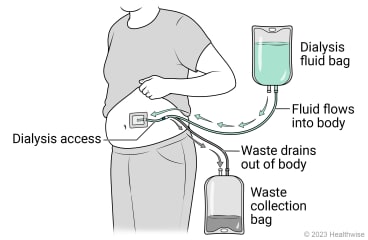What is peritoneal dialysis?

Dialysis does the work of your kidneys when you have kidney failure. It filters wastes and removes extra fluid. And it works to restore the right balance of chemicals in the blood.
Peritoneal dialysis (say "pair-uh-tuh-NEE-uhl dy-AL-uh-sus") uses the lining of your belly to filter your blood. This lining is called the peritoneal membrane.
Before you can start this type of dialysis, a doctor has to make a dialysis access in your belly. This is the place where dialysis fluid flows into and out of your body. This is most often done 10 to 14 days before dialysis starts. The dialysis fluid pulls excess fluid and wastes from the body.
You don't need to go to a dialysis center for peritoneal dialysis. Instead, you will do your own treatments at home or in any clean place. You may be able to do it when you sleep.
You can do peritoneal dialysis yourself or have a machine help you.
What happens in peritoneal dialysis?
The process of doing peritoneal dialysis is called an exchange. Each exchange has three steps: fill, dwell, and drain.
- Fill: Dialysis fluid enters your belly through the catheter. The fluid is a mix of sugar, water, and electrolytes. Electrolytes are minerals such as sodium, potassium, and calcium.
- Dwell: While the fluid is in your belly, extra fluid and waste travel into the dialysis fluid.
- Drain: The fluid is drained and then replaced with new fluid.
How do you do peritoneal dialysis?
How the exchange is done, how often you do it, and how long it takes depend on the type of peritoneal dialysis you use.
Continuous ambulatory peritoneal dialysis (CAPD)
- You attach the bag of fluid to the catheter and let it flow into your belly. The fluid stays in your belly for about 4 to 6 hours. During this time you can move around and do most of your normal activities.
- After this time, you drain the fluid out of your belly. You then put fresh fluid in your belly.
- You need to do this about 4 times a day.
- It takes about 30 to 40 minutes to drain and refill your belly.
Continuous cycler peritoneal dialysis (CCPD)
- A machine fills and drains the fluid from your belly.
- This process often takes about 8 to 12 hours. This means you can do CCPD at night while you sleep.
Follow-up care is a key part of your treatment and safety. Be sure to make and go to all appointments, and call your doctor if you are having problems. It's also a good idea to know your test results and keep a list of the medicines you take.
Where can you learn more?
Go to http://www.healthwise.net/patientEd
Enter X546 in the search box to learn more about "Learning About Peritoneal Dialysis".
Current as of: October 11, 2024
Author: Ignite Healthwise, LLC Staff
Clinical Review Board
All Ignite Healthwise, LLC education is reviewed by a team that includes physicians, nurses, advanced practitioners, registered dieticians, and other healthcare professionals.

